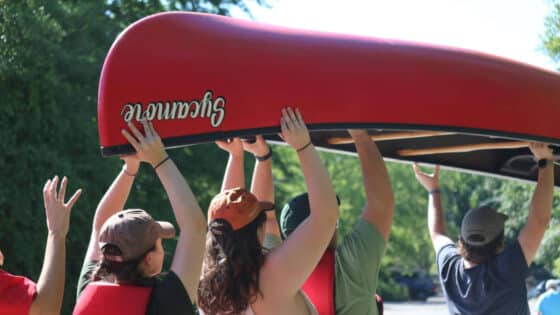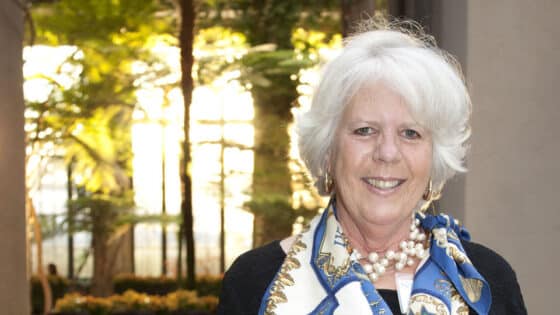By Dr. James G. Blaine
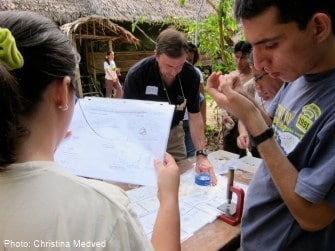
The Amazon is the largest river in the world. Flowing through Peru, Bolivia, Venezuela, Colombia, Ecuador, and Brazil, it drains 40 percent of the continent of South America, its watershed covers more than 2.7 million square miles, and it carries a fifth of the world’s freshwater discharge to the ocean—a volume greater than the 10 next largest rivers combined. Its thousands of tributaries include 12 that are themselves over 1,000 miles long.
Perhaps we should add one more tributary to the list: White Clay Creek.
For while it is true that the White Clay does not run within 3,000 miles of the Amazon, the knowledge that the Stroud Water Research Center’s scientists have gleaned from its waters and the programs that the Stroud Center’s educators have pioneered on its banks increasingly flow to the vast river and the people who seek to protect it.
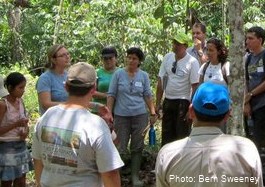
The latest example came in September when Director Dr. Bern Sweeney and Educator Christina Medved led a week-long program in the Amazonian headwaters of Peru. Their goal was to use the Leaf Pack Kit and the Leaf Pack Network® website created by the Stroud Center’s scientists and educators to teach local citizens how to monitor the quality of their water and assess the degradation in their streams. In two packed workshops, Sweeney and Medved introduced the new Spanish-language version of Leaf Pack—the latest development in their ongoing efforts to expand the program across Latin America and ultimately around the world.
STANDING ROOM ONLY IN PUCALLPA
The trip, which was organized by the Amazon Center for Environmental Education and Research (ACEER) based at West Chester University and funded by a Conservation Trust Grant from the National Geographic Society, took Sweeney and Medved to northeastern Peru. They gave the first of two workshops in Iquitos, a city of half a million people—and the largest city in the world that is not accessible by car. They then flew to the town of Pucallpa on the banks of the Ucayali River, a major tributary to the Amazon, where they gave a second workshop in a village of the indigenous Shipibo people. Although the region that the Shipibo call home is deep in the rainforest, the recent construction of a direct highway connection to Lima has subjected it to sudden, rapid and bewildering growth.
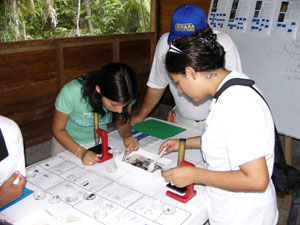
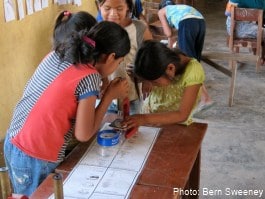
At each workshop Sweeney, Medved, and their colleagues taught teachers, biologists, local officials, foresters, landowners, and conservation workers how to use Leaf Pack data to assess water quality. Their goal is to create a conservation ethic that integrates ordinary people into the decision-making process by putting simple assessment tools, such as the Leaf Pack, into their hands. Twenty-four people attended the Iquitos workshop, and the 25 who officially signed up in Pucallpa were accompanied by many other villagers of all ages.
The information and training the Stroud Center’s group provided are getting to the rainforest none too soon. Because much of the river flows through areas where there are few roads and cities, its water is relatively clean. But the pressure to develop the interior and mine the forest is enormous, and the consequences to water quality correspondingly great. In fact, the streams the workshop participants tested were already stressed, often to the surprise of the villagers. “This has been a good experience,” said one attendee, “even though the biotic index told us the watershed was polluted.”
EXPANDING ON TWO DECADES OF TROPICAL STREAM RESEARCH
This Amazonian project did not come out of the blue. For more than two decades, Stroud™ Water Research Center scientists have done basic research on tropical streams at their Maritza field station in Costa Rica. From there they have branched out to give workshops across that country and do basic research in other parts of Central and South America. In 2006, again in association with ACEER, the Center completed a massive physical, chemical, and biological inventory of streams and rivers in the Madre de Dios watershed in Peru. Funded by the Moore Foundation, the study led to workshops in both Peru and Costa Rica on the effects of land use on water quality and the power of the Leaf Pack protocol to assess their impact. Those workshops revealed a genuine grass-roots interest in environmental education and water contamination issues. In response, in October 2008 the Stroud Water Research Center hosted 18 scientists, educators, and conservation workers from Latin America at a workshop to test a Spanish translation of the Leaf Pack and to develop a pilot program to pursue its dissemination throughout the region. At the end of the workshop, the participants were charged to become “Leaf Pack Ambassadors,” who would return home to spread the word and give workshops of their own.
That history was much in evidence on the September trip. Accompanying Sweeney and Medved were Wills Flowers, an entomologist at Florida A & M University, who had been part of the first Peruvian study and subsequent workshops, and Francisco “Paco” Ollervides, Senior Field Coordinator for Waterkeeper Alliance and a participant in the 2008 workshop. Greeting the group in Peru was Therany Gonzales-Ojeda, who works with ACEER and is also a Leaf Pack Ambassador.
The story of the Peru workshops and the Latin American Leaf Pack, like everything the Stroud Water Research Center has accomplished, has its origins on the small stream that runs beside its laboratory in Avondale, Pennsylvania — White Clay Creek.
Learn More
- Read about the Stroud Center’s Peru Project
- Read about the Spanish language Leaf Pack Workshop

